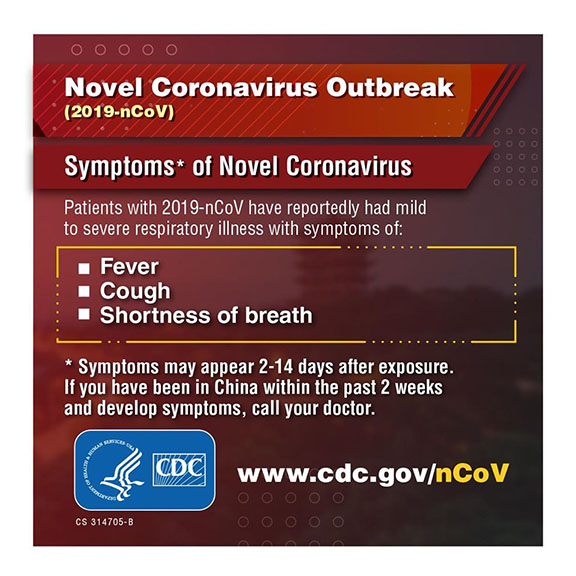
By Eileen Moon | Published Jan. 30, 2020
With the height of the flu season upon us, business at Bayshore Pharmacy in Atlantic Highlands has been brisk.
But along with the chills, fever, coughs and runny noses that accompany the flu, some customers are suffering from worries about contracting the novel coronavirus (NcoV), said pharmacist Richard Stryker. Symptoms of NcoV are similar to the flu but can swiftly progress to more serious complications like pneumonia.
Fortunately, the risk of contracting the new virus first identified in Wuhan, China in December is low.
Nevertheless, concern about contracting the new virus is rising.
“We’ve been getting quite a few questions,” Stryker said. “The news has it pretty whipped up.”
Like other health care professionals in the state, Bayshore is relying on updates from the Centers for Disease Control and Prevention (CDC) and the New Jersey Department of Public Health to advise its customers.
The pharmacy did experience a bit of a run on face masks this week but, Stryker said, their effectiveness in blocking an individual from contracting the virus isn’t great because the masks aren’t capable of preventing the inhalation of the virus. They’re more valuable in preventing someone who is already sick from spreading germs through sneezing and coughing.
According to Jerry M. Zuckerman, M.D., vice president of infection prevention and control at Hackensack Meridian Health, coronaviruses are a large family of viruses which are thought to cause up to 30 percent of common cold cases.
“Certain strains like SARS (Severe Acute Respiratory Syndrome), which appeared in 2002, and MERS (Middle East Respiratory Syndrome), which appeared in 2012 and now the 2019 novel coronavirus can cause more serious illness,” Zuckerman said.
Hackensack Meridian encompasses nine medical centers around the state, including Riverview in Red Bank and Bayshore in Holmdel.
No cases of NcoV have been identified in any of Hackensack Meridian’s facilities, Zuckerman said.
While the risk of contracting the NcoV virus here in the U.S. is low, the threat remains serious, Zuckerman stressed.
“At this time, there are more than 6,000 confirmed cases. The majority of the cases are in China, which has experienced at least 132 deaths. There are 92 confirmed cases outside of China, with five cases in the United States.”
While those numbers appear alarming, it helps to keep in mind that more than 11 million people reside in the epicenter of the virus outbreak in the city of Wuhan.
The five cases of NcoV identified in the United States as of Jan. 29 have occurred in patients who had recently been in China.
Those cases have been confirmed in Washington, California, Arizona and Illinois, the CDC reported.
The sneezing and coughing most people are doing around the Two River area these days are not caused by NcoV but instead related to the perennial winter woes that come with the common cold and flu.
Nevertheless, the appearance of NcoV in our increasingly global community has been ramping up fears on social media.
To combat a wave of misinformation being generated as the word spreads, the New Jersey Department of Health has established a hotline in cooperation with the NJ Poison Control Center to answer residents’ questions about the new virus and allay unnecessary fears.
“Although the risk to the public remains low, we understand that residents have questions about this new virus,” New Jersey Department of Health commissioner Judith Persichilli noted in a press release. “This hotline provides factual information to alleviate fear and dispel rumors.”
The hotline is part of a wide-reaching effort by the medical and scientific communities to reassure the public while taking steps to identify and treat any patients who contract NcoV.
Bruce Ruck, managing director of the NJ Poison Control Center at Rutgers New Jersey Medical School, said that his office has received more than 100 calls about the corona virus in the last 24 hours.
The majority of the calls fall into the category of, “Am I at risk?” he said. That includes people who have recently traveled to or from China, people planning to travel there individually or as members of international exchange programs, and people who have returned from China with children who will be re-entering school in New Jersey.
Meanwhile, government officials at all levels are working to halt transmission of the virus.
In Monmouth County, Freeholder Deputy Director Sue Kiley, liaison to the county health and human services department, said the county is maintaining close contact with area hospitals and is prepared to respond should the virus appear. Right now, Kiley said, it’s not an issue. “Obviously, we’re watching it very closely.”
Earlier this week, U.S. Sens. Bob Menendez and Cory Booker of New Jersey called for NcoV passenger screenings to be instituted at Newark Liberty International Airport, the fifth busiest airport in the nation.
Newark has since been added to the list of airports conducting enhanced screenings.
British Airways and a few smaller airlines have suspended all flights to China and United Airlines has reduced its service there.
Meanwhile, New Jersey Congressman Frank Pallone (D-6), who chairs the House of Representatives Energy and Commerce Committee, which oversees public health and quarantine, is advising Americans to rely on the CDC and other reliable sources for updates rather than social media. “The information that I have right now is that we shouldn’t panic,” he said during an appearance on MSNBC last Tuesday. “There’s a lot of misinformation out there.”
“The biggest concern right now is that we don’t really know what this coronavirus is…we need to know more about the virus itself, how it’s transmitted, what is its impact and there’s not a lot of information out there right now.”
In an effort to halt the transmission of the virus, Chinese officials have instituted a quarantine in Wuhan, the epicenter of the virus.
For Americans set to travel to China soon for business or vacation, the threat of NcoV very likely means a change in plans.
“It’s funny, it was a similar situation with the SARS virus,” noted Ted Friedli, owner of Excel Travel in Long Branch.
“Media and the government blow these things out of proportion,” Friedli says. “There’s so many other things that we could worry about, like getting hit by a car on the Garden State Parkway.”
Travel to China and the Far East has grown increasingly popular in recent years, Friedli said.
One client who contacted him with concerns about the virus has plans to travel to China in 2022.
Friedli advised him to remain calm and wait things out.
“There could be so many more diseases between now and then,” he said.
Those with upcoming reservations who are facing a change of plan and a possible loss of their vacation dollars, Friedli said, have the option to cancel, postpone or change their plans and some travel providers will be generous in helping them make the best choice with the least amount of financial pain. But, Friedli said, “The biggest lesson is to do something in advance: Take out some travel insurance. There are policies you can buy that allow you to cancel for any reason whatsoever.”
So, what can people do to avoid contracting NcoV?
The best defense is prevention, health experts say: Wash your hands after coughing or sneezing, use a tissue or, in a pinch, your sleeve to cough or sneeze into rather than your hands. Try to avoid touching your face.
“Basically, all those things your mother told you,” said Stryker, the pharmacist.














